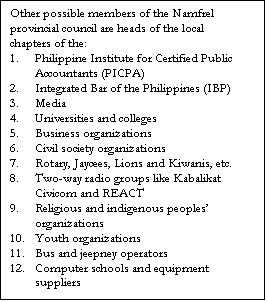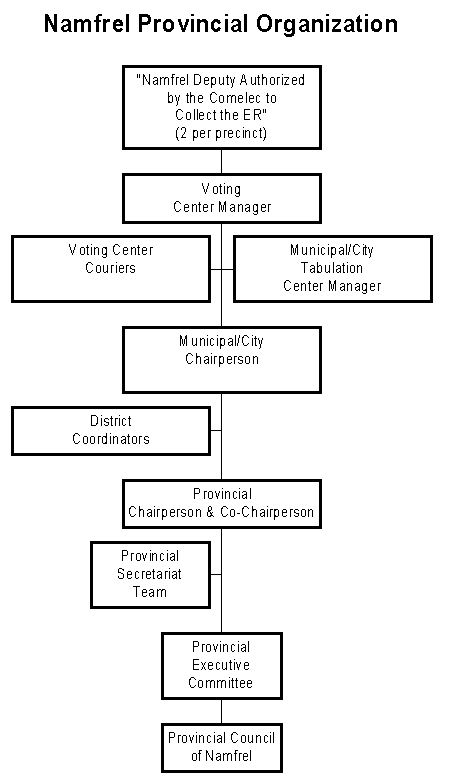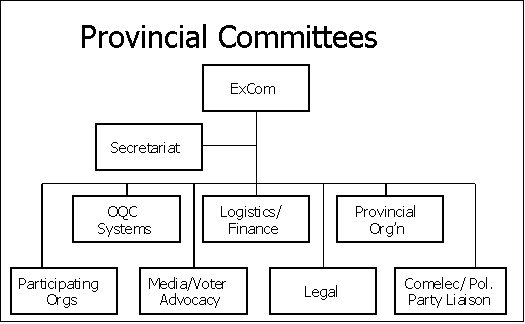Organizing a provincial and
city/municipal chapter
“Democracy
is based on the conviction that there are extraordinary possibilities in
ordinary people”
question
is often asked: “What is the most effective and fastest way to
organize?”
There are no fixed answers. Your chapter must adapt to the realities of your particular
environment. However, based
on the experience of our more successful chapters in the past, some
principles and methods stand out which helped resolve problems of
recruitment and motivation of volunteers, of securing public support and
of reducing friction and misunderstandings, with the Comelec, government
officials, military and teachers.
1)
Rule of Thumb: The ideal minimum number of volunteers in your area should be at least
two (2) volunteers per precinct.
2)
Encourage volunteering by family and barkada. If Namfrel becomes an
affair among family and friends, participation becomes a total community
effort.
3)
Although we encourage lay people to take the lead in organizing
Namfrel chapters, given the time constraints, the
fastest way to organize is to recruit by organization like churches,
business groups, and association of schools, and request their leaders to
convene an organizational meeting wherein the following are
invited:
a)
all religious leaders (parish priests, Christian pastors, Muslim
aleems, imams and ulamas)
b)
heads of civic, professional, business groups and other
participating organizations;
c)
heads and faculty of schools;
d)
student and youth leaders;
e)
other respected leaders in the community;
f)
media;
g)
former Namfrel volunteers.
There
are regular monthly or quarterly meetings in your diocese, church or your
local organizations. If there
is time, request permission from the head of the organizations to address
the assembly to seek support for Namfrel.
For big and important meetings like these, Namfrel will try to send
a member of the National Council and/or trainors to serve as resource
persons.
4)
Establish good relations with the Comelec registrar, school
superintendent, local police chief and media. Suggest the
formation of an ad hoc coordinating committee among them and the Namfrel
Chairperson who will be available to resolve problems before and during
election day.
5)
Keep in mind that people respond favorably to a positive approach
and that there are many decent people in government who share the
objective of clean and orderly elections.
Do not pre-judge. Reach
out to all sectors. You
can be firm in your convictions without being overly self-righteous and
disagreeable.
6)
Invite the Comelec registrar, public school superintendent and military
commander in your area to address Namfrel meetings.
Organize
a joint OQC workshop for Namfrel and other volunteers and public school
teachers to avoid misunderstandings about the functions of volunteers.
7)
The commitment of our volunteers will depend to a large extent on your
own commitment and role modeling.
8)
In organizing, you will have to exercise patience to the utmost degree.
You
may have to go back again and again to convince and motivate people to
take up the Namfrel cause. Regularly
“follow-up” the units under you.
Since Namfrel is a purely voluntary organization, the people you
will be dealing with will have varied personalities, persuasions and
experience. You will be
subjected to all kinds of pressure that will constantly test your resolve.
There will be campaigns to discredit and discourage you. Namfrel
represents hope, despite many odds. You
have to be strong and constant in your own faith if you are to attract
others to join our cause.
9)
Always remember to pray.
Open and close meetings with a prayer.
You cannot do it alone.
Stage
1: Recruitment and Organizational Stage
In this stage, the provincial
and city or municipal chairperson convenes a meeting of leaders from all
civic, religious, professional, business, labor, educational, youth and
other non-partisan organizations to update volunteers on recent
developments regarding the elections and to recruit new volunteers.
At the end of stage 1, a
Namfrel chapter must have:
1)
Secured the commitment of supporting or cooperating sectors (i.e.,
business, civic, religious, educational, youth, service, professional,
labor and women’s organizations) through a series of meetings and
motivational sessions such as workshops, candle-lighting ceremonies, etc.
2)
Formed and activated the Provincial or City/Municipal Council and
the Provincial or City/Municipal Executive Committee
 You may select from among the members of your
You may select from among the members of your
provincial council who are
likely to be major
contributors to your efforts
and ask them to be a
member of the provincial ExCom.
It is probably
fitting to involve them in the
decision-making and
operations of the provincial
Namfrel.
In the province of Batangas the
provincial council is co-chaired by Archbishop Gaudencio Rosales and Bro.
Rafael Donato, FSC (president of De La Salle, Lipa City) with the Comelec
provincial election supervisor, the Philippine National Police (PNP)
provincial superintendent and the
Department of Education Culture
and Sports (DECS) provincial superintendent as members.
The representation in the Nueva Ecija chapter of Namfrel is
similar.
The main tasks of the PExCom
are:
a)
To
complete the provincial OQC within the prescribed period.

b)
Assist municipal and city chapters in their volunteer recruitment
efforts by organizing a province-wide, media-based recruitment and voter
involvement campaign, etc.
c)
Secure
logistical and financial support for the municipal and city chapters’
operations, for the provincial secretariat, for provincial operations, and
for the Provincial Tabulation Center.
Logistical support may include securing sponsorship for set-up of
intra-province communication system, securing fuel donations, use of
computers and fax machines at the Provincial Tabulation Center and for
other purposes.
d)
Liaise
with the Comelec, DECS, PNP, Department of Finance (under which the
municipal treasurers, who are in-charge of the distribution of election
materials and paraphernalia before the elections, report to), and with
political party representatives and candidates.
Liaison
with the Comelec is necessary to secure the location of precincts and
their respective voting centers or schools in each city and municipality
in the province because these information will be used to determine the
number of volunteers needed to collect all the ERs.
Each voting center will have a manager whose task is to ensure the
organized and systematic collection of the ER from all the precincts in
the voting center and the delivery of the ERs to the city or municipal
tabulation center.
Many provincial
chapters offer pollwatching training to political party watchers to
enhance the party/candidate watchers’ competence in monitoring the
polls. The political parties
take care of the venue, reproduction of materials and other arrangements
for this training.
3)
 Inventoried
available resources in terms of:
Inventoried
available resources in terms of:
a)
Finances
b)
Vehicles
c)
Communications
equipment
d)
Office
equipment
e)
Food
f)
Office
supplies
g)
Personnel
skills
h)
Others
4)
Established a harmonious working relationship among the volunteers
and member associations.
5)
Identified possible sources of funds to support the chapter’s
activities and projects.
6)
Organized the appropriate committees/groups such as:
a)
Secretariat - To serve the administrative, secretarial and clerical requirements of
the chapter, under the supervision of the Secretary-General, and to
coordinate the activities of the various committees.
b)
 Municipal/City
Chapter’s Organization and Training Committee – To identify, together with the PExCom, potential
members of municipal and city councils (similar to the provincial
council). The council
members, in turn, elect their chairperson and co-chairperson and committee
chairs.
Municipal/City
Chapter’s Organization and Training Committee – To identify, together with the PExCom, potential
members of municipal and city councils (similar to the provincial
council). The council
members, in turn, elect their chairperson and co-chairperson and committee
chairs.
Owing
to the fact that there will always be new members of Namfrel especially
from the youth sector and that they have not had the same orientation as
many of us original Namfrel volunteers in the 1984, 1986 and 1987 election
situations, it is extremely important to include motivational and basic
rationale for the need for citizens to involve themselves in Namfrel.
c)
Logistics and Finance Committee – It may be advisable to identify down to
detail the logistical needs for provincial and municipal operations of a
chapter because it has been increasingly difficult to secure financial
donations from organizations and individuals.
In our experience, it is relatively easier to solicit non-cash
donations especially if this is sought from goods manufacturers or dealers
themselves. Soliciting
non-cash donations from multiple donors is advisable as it will be easier
for companies to give in smaller quantities. (For example, instead of
asking for 100 reams of paper from only one supplier, you can solicit 10
reams each from 10 suppliers).
Instead
of spending for photocopying expenses, you might want to ask a local
photocopying or documents reproduction company to sponsor the provincial
chapter’s needs. You
might want to also solicit the paper needed for the document reproduction
company from paper suppliers in your area.
d)
 OQC
Systems Committee –
To determine and provide the software and hardware, and volunteer skills
and number requirements for the conduct of the OQC at the provincial
tabulation center and at the different municipal or city tabulation
centers.
OQC
Systems Committee –
To determine and provide the software and hardware, and volunteer skills
and number requirements for the conduct of the OQC at the provincial
tabulation center and at the different municipal or city tabulation
centers.
This
committee could also be tasked to set-up the mode of transport or
transmission of election results from each city or municipality in the
province and from the province to the National Tabulation Center in
Manila.
e)
Participating Organizations Committee
– In 1998 we had 125 organizations representing practically all sectors
of society committed to support Namfrel’s efforts.
This committee is tasked to invite various organizations like the
professional groups of doctors, engineers, accountants, computer experts,
etc. to join Namfrel and to contribute in whatever capacity to the cause.
f)
Legal Committee – At several instances, Namfrel was asked to
testify before local courts where election protests are filed to present
its OQC results. The most
recent was in 1998 in Ternate, Cavite where Namfrel results and our copies
of the ERs (6th copies) were used to reverse the results of the
mayoral elections.
You
might need lawyers’ assistance in the monitoring of the canvassing at
the municipal, district and provincial canvass especially if there are
differences in the canvass results and the OQC results, both of which are
supposed to be based on a single document, that is the ER.
g)
Speaker’s Bureau or Media/Voter Advocacy Committee –
It would be very useful as support to the volunteer recruitment and
logistics solicitation efforts that the provincial Namfrel initiate a
province-wide awareness program. This
program, which could be on tri-media, could include basic information on
the elections like registration, the process of voting, importance and
relevance of elections in governance, accountability of the voters’
vote, and other strategies that will encourage the voter to get involved
in the elections.
The
national Media/Voter Advocacy Committee is embarking on a “Every voter a
pollwatcher” theme for the 2001 polls.
The programs arising from this committee hopes to encourage voters,
to not only vote, but also safeguard their vote and to make sure that it
is counted properly.
This
committee will also be tasked to schedule appearances, interviews and
guesting of Namfrel in the tri-media and before various groups that may
want to know what Namfrel will be doing in the 2001 polls and other
information on operations.
h)
Comelec and Political Party Liaison Committee –
This committee will primarily be engaged in securing from the Comelec
copies of relevant resolutions and orders, especially on the clustering of
precincts and the mobilization to special task forces to supervise the
polls. This committee will
also be tasked to ensure that Namfrel is recognized in the province and
that the volunteers (with their proper identification) will indeed be
given the 4th or 6th copies of the election returns
that are due Namfrel as an accredited citizens’ arm of the Comelec.
This
committee will also be charged to ensure that Namfrel is represented in
the Comelec briefing for the different city or municipal election officers
and for the boards of election inspectors (BEI).
Our representation in these orientations by the Comelec will
promote better rapport and camaraderie among the Comelec, DECS, other
Comelec deputized agencies and Namfrel.
The
conduct of the elections – peacefulness and orderliness are to a general
extent dictated by the candidates and their supporters.
Namfrel has been known to contribute in securing covenants and palabra
de honor from the candidates that the latter will use neither force
nor coercion to get elected. Such
covenants and offers from Namfrel to train candidate watchers could be
among the tasks of this committee.

7)
Recruited
volunteers according to the objectives and other guidelines of the 2001
OQC illustrated in Module 4
At the city or
municipal level, it is the task of the city or municipal chairpersons and
council members to recruit Voting Center Managers (VCMs) for each school
or voting center, and to assist the VCMs in recruiting and training
precinct volunteers who are known as “Namfrel Deputy Authorized by the
Comelec to Collect the Election Returns”.
Due to the long hours
of counting, evidenced during the 1998 polls, we advise recruiting two
(2) volunteers per precinct. All
Namfrel volunteers will be issued identification cards by the city or
municipal chairperson.
There are countless
creative ways to send the message of involvement to various sectors and
encourage them to join Namfrel.
In terms of manpower, the youth sector has time and again proven to
be the greatest contributor of manpower for Namfrel.
Namfrel chapters in Region 6
have decided to recruit volunteers at the universities and colleges that
are located at their capital towns and cities.
They will set up a Namfrel desk in these schools to accept
volunteers and to brief volunteers of their duties during the elections.
When the students who have volunteered return to their respective
municipalities or cities during the summer vacation, they can already
enlist before the municipal or city chapter, who will be expecting these
volunteers, having been provided the volunteer’s sign-up sheet by the
Namfrel chapter of the capital town or city that initiated the recruitment
campaign.
Former volunteer or
“veteran” volunteers of Namfrel should be tapped again as they are
already familiar with its operations.
They can be asked to be VCMs who, aside from the tasks previously
mentioned, can initiate coordination with the teachers who will be serving
as BEIs in the school or voting center of which he or she is manager.
Stage
2: Planning and Training Stage
Based on the assessment of the
capabilities of its chapter membership, the working committees plan the
activities and conduct needed training sessions.
At the end of this stage, a
Namfrel chapter must have:
1)
Secured
information/data on precincts, voting centers and voters’ list.
2)
Prepared
detailed plans that would serve as the chapter blueprint of activities and
guide during contingencies. A
part of the detailed plan is determining courier routes and other
strategies for the efficient and systematic collection of all ERs from
each precinct in the city or municipality through the VCMs.
3)
Assessed
the capabilities and limitations of Namfrel volunteers.
4)
Given
volunteers their respective assignments appropriate to their talents and
skills.
5)
Made
arrangements with the Comelec to secure the copy for Namfrel at the
municipal or city canvassing boards when the BEI reports and surrenders
the 1st copy of the ER to the board, in case ERs are not
released by the BEIs to the “Namfrel Deputies”.
6)
Conducted
appropriate training programs on voters’ assistance activities and OQC.
Stage
3: Operational Stage
At this stage, the Namfrel
chapter goes into action to safeguard the electoral process particularly
the conduct of OQC. Refer to
Module 4 for an extensive discussion on the OQC.
Stage
4: Evaluation and Reporting Stage
 In
the final stage, a Namfrel chapter evaluates the overall conduct of
elections, documents all irregularities, and transmits its report as soon
as possible to Namfrel’s provincial or national headquarters.
In
the final stage, a Namfrel chapter evaluates the overall conduct of
elections, documents all irregularities, and transmits its report as soon
as possible to Namfrel’s provincial or national headquarters.
In this stage, a total review
of the chapter operations is made to pinpoint and record chapter
performance and effectiveness as well as weaknesses and failures.
At
the end of the Evaluation and Reporting Stage, the Namfrel local chapter
must have:
1)
Documented and transmitted the results of the counting as well as
the observations made during the counting and canvassing periods to the
Provincial and National Headquarters.
2)
Determined the strong and weak points of the chapter.
3)
Identified possible areas for improvement.
4)
Submitted a copy of the results of their self-evaluation to the
Namfrel National Office.
5)
Laid out plans to facilitate the reorganization of their chapter
for future activities.
6)
Appropriately acknowledged all those who helped and supported the
chapter by issuing certificates of recognition.



For any
inquiries or comment, you may contact the WEBMASTER
Last Updated: Monday, April 02, 2001 02:17:07 AM